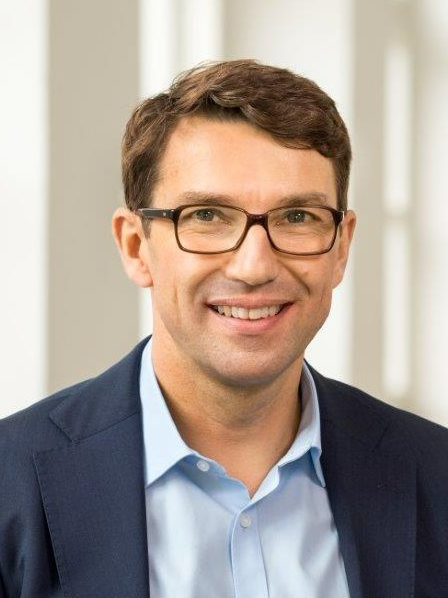ACADEMIC CAREER AND RESEARCH AREAS
Professor Haller (b. 1968) conducts research in the field of nutrition science. The main focus of his research is on bacteria (microbiota) in the intestine and their role both in chronic inflammatory diseases like Crohn’s disease and in carcinogenesis. Epithelial tissue, which acts as a boundary with both metabolic and immunological functions in the intestine, occupies a central position in Professor Haller’s research work. He has acquired fundamental insights into the molecular interaction of complex microbial ecosystems, the microbiome, with barrier and immune cells in the gut. His work with newly developed gnotobiotic mouse models (selective colonization of germ-free animals) and patients has made significant contributions to our understanding of the mechanisms of inflammatory and tumor diseases. His research focuses on changes in the microbial milieu in the pathogenesis of complex diseases.
After graduating from the University of Hohenheim with a joint honors degree, Professor Haller completed a doctoral thesis in the field of food microbiology and nutrition science. He then worked in Switzerland and the USA as a visiting researcher, before being admitted to the Emmy Noether Programme of the German Research Foundation (DFG) and joining TUM as a Junior Research Group Leader. After receiving offers from Canada (University of Alberta) and Switzerland (ETH Zürich), he now holds the Chair of Nutrition and Immunology and directs the ZIEL Institute for Food and Health at the TUM Weihenstephan Campus. Prof. Haller directs and coordinates a number of international and national research programs (DFG priority; SPP1656). The establishment of a new DFG Collaborative Research Center (Microbiome Signatures; SFB1371) under his leadership is a unique position for Nutritional Science at TUM and strengthens the research focus on microbiomes. He has received awards for his research from the European Society of Gastroenterology (Distinguished UEG Research Prize), the German Society for Hygiene and Microbiology (DGHM Main Prize) and the Technical University of Munich (Heinz-Maier- Leibnitz Medal).
AWARDS
- ERC Review Panel Head for the Consolidator Program (2015 und 2017)
- Main Prize of the German Society for Hygiene and Microbiology (DGHM) (2015)
- Emmy Noether Programme, German Research Foundation (DFG) (2000-2006)
KEY PUBLICATIONS (ALL PUBLICATIONS)
- Reitmeier S, Kiessling S, Clavel T, List M, Almeida EL, Ghosh TS, Neuhaus K, Grallert H, Linseisen J, Skurk T, Brandl B, Breuninger TA, Troll M, Rathmann W, Linkohr B, Hauner H, Laudes M, Franke A, Le Roy CI, Bell JT, Spector T, Baumbach J, O’Toole PW, Peters A, Haller D.: “Arrhythmic Gut Microbiome Signatures Predict Risk of Type 2 Diabetes”. Cell Host Microbe. 2020; Jun 29:1931-3128(20)30343-7.
Abstract
- Metwaly A, Dunkel A, Waldschmitt N, Chakravarthy Durai Raj A, Lagkouvardos I, Corraliza AM, Mayorgas A, Martinez-Medina M, Reiter S, Schloter M, Hofmann T, Allez M, Panes J, Salas A, Haller D.: “Integrated microbiota and metabolite profiles link Crohn’s disease to sulfur metabolism”. Nature Commun. 2020 Aug 28; 11(1):4322.
Abstract - Khaloian S, Rath E, Hammoudi N, Gleisinger E, Blutke A, Giesbertz P, Berger E, Metwaly A, Waldschmitt N, Allez M, Haller D.: “Mitochondrial impairment drives intestinal stem cell transition into dysfunctional Paneth cells predicting Crohn’s disease recurrence”. Gut. 2020 Nov; 69(11):1939-1951.
Abstract - Coleman OI, Lobner EM, Bierwirth S, Sorbie A, Waldschmitt N, Rath E, Berger E, Lagkouvardos I, Clavel T, McCoy KD, Weber A, Heikenwalder M, Janssen KP, and Haller D: “Activated ATF6 Induces Intestinal Dysbiosis and Innate Immune Response to Promote Colorectal Tumorigenesis”. Gastroenterology. 2018. 155(5): 1539-1552.e12.
Abstract - Schaubeck M, Clavel T, Calasan J, Lagkouvardos I, Haange SB, Jehmlich N, Basic M, Dupont A, Hornef M, Bergen MV, Bleich A, Haller D. “Dysbiotic gut microbiota causes transmissible Crohn’s disease-like ileitis independent of failure in antimicrobial defence”. Gut. 2016; 65(2): 225-237.
Abstract

